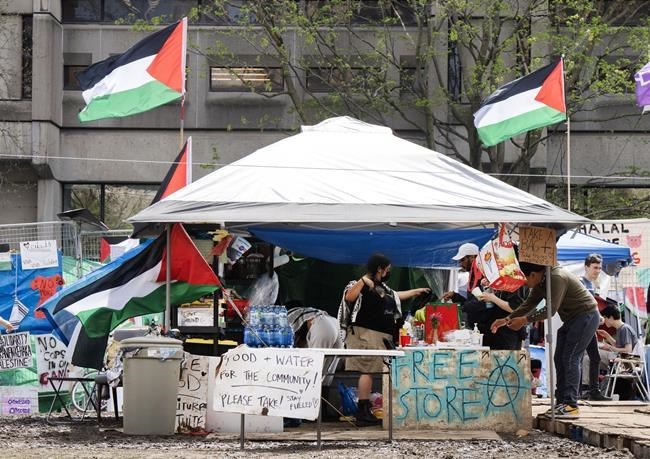Montreal pro-Palestinian activists said Sunday they've set up a new encampment at the Université du Québec à Montréal, as nearby McGill University prepares to go to court to clear the protest camp that has been on its grounds since April 27.
Solidarité pour les droits Humains des Palestiniennes et Palestiniens said in a news release that UQAM is joining the international student movement in solidarity with the people of Palestine amid the ongoing Israel-Hamas war.
The protesters are demanding their university cut ties with Israeli institutions and disclose all its links to Israel, and that the Quebec government abolish plans for a diplomatic office in Israel.
"As the occupying forces intensify their murderous aggression against Rafah, we, students and workers, refuse to remain silent in the face of the apartheid, genocide and colonial crimes of the State of Israel,” said Leila Khaled, spokesperson for the camp, which calls itself Université Populaire Al-Aqsa.
“We are addressing UQAM, but also the Quebec state and the Canadian state to take action to end their collaboration and complicity with the rogue state.”
They also want McGill to withdraw its request for a court order to clear the encampment on its lower field, and a stop to all attempts to "judicialize" protesters.
The news release said the activists have no intention of leaving the UQAM encampment until their demands are met, and are encouraging protesters at other campuses to follow suit.
Following the lead of protesters on U.S. campuses, demonstrators in Canada have erected encampments at universities in Montreal, Toronto, Ottawa and Vancouver as well as in Edmonton and Calgary, where police have moved to forcibly remove protesters.
Edmonton police dismantled a pro-Palestinian encampment on the University of Alberta's campus on Saturday, prompting outrage from students and academics who described the operation as violent and contested allegations that demonstrators were breaking the law.
On Sunday, University of Alberta President Bill Flanagan acknowledged the public concern surrounding the school's decision to call in police, which he said had been "tremendously difficult" to make.
However, he said the university had a duty to act given the safety concerns at the site, adding that fire hazards as well as "potential weapons" such as hammers, axes and screwdrivers were found following dismantlement.
"There can be no question that the encampment posed a serious and imminent risk of potential violence and injury to university community members and members of the public," he wrote. He said peaceful protests will continue to be tolerated.
Organizers of the Edmonton protest responded that the only violence and injury that occurred was when police showed up. They also disputed that the tools Flanagan referred to could be construed as weapons.
"Perhaps President Flanagan is not an active camper, but all tools (not weapons) on site were standard items useful for tasks like putting up banners on stakes," the group People’s University for Palestine said in a statement Sunday.
McGill University, meanwhile, will ask a judge on Monday to order protesters to stop camping on or occupying its grounds, and to authorize Montreal police to assist the school in dismantling the encampment if called upon.
In a judicial application for an injunction dated Friday, McGill framed its request around sanitary concerns and what it described as the "risk of violence and intimidation."
The filing cites "fierce verbal exchanges" between protesters and counter-protesters earlier this month, barrels of "human waste" on site, possible fire code breaches such as a single point of exit and the encampment's potential as a "magnet" for further clashes.
On top of a doubling of the security detail on the quad, McGill said it will likely have to spend more than $700,000 on an alternate venue for spring convocation ceremonies that are typically held on the grounds partially occupied by the protesters.
It said attempts to negotiate an end to the encampment through lawyers has not succeeded, and that Montreal police have thus far declined to intervene "as their criteria for a police intervention were not met."
This report by The Canadian Press was first published May 12, 2024.
Morgan Lowrie, The Canadian Press

